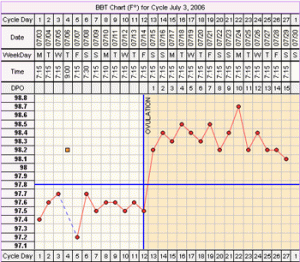There are many forms to fill out when you decide to try IVF or some other assisted reproduction method. One of those forms is called the BBT Chart or the basal body temperature chart. The BBT chart is essential to knowing the time when ovulation is occurring. If you keep track of your BBT accurately, you can get pregnant faster. Once you know when you’re likely to ovulate, you can have sex (or plan insemination) at the best time for conceiving.
The BBT chart is a simple method of estimating the time of ovulation. You chart a daily oral temperature. If you observe the chart for a whole menstrual cycle, you will notice that your temperature is lower during the first part of the menstrual cycle than it is during the last 2 weeks. The temperature shift occurs near ovulation. Ovulation is assumed to occur when there is a rise of 0.4 to 0.6°F or more between 24 hour readings. (see sample chart below)

Now that you know a little more about tracking your basal body temperature and knowing when you ovulate, you should use the following step by step instructions for filling out the BBT chart every day:
- Use only a special “metabolic” thermometer with a Fahrenheit scale. Learn to read it accurately.
- Shake down the thermometer before you go to bed and place it on your bedside table.
- Take your temperature each morning immediately after waking, before rising, eating, drinking, smoking or undertaking any type of physical activity. Temperature should be taken for 5 minutes, by the clock. Record your temperature as a solid dot at the intersection of the appropriate temperature and date lines.
- Also indicate,in the appropriate places, when intercourse and menstruation occur. And note, on the chart, any reasons for temperature variation such as illness, infection, insomnia, etc. Be sure to place an “x” on the medication line. Then write in the name of any medication, such as aspirin, acetaminophen, antihistamine or antibiotic, taken during the month.
- Your BBT is an indirect predictor that cannot pinpoint the exact day of ovulation. Therefore, it is important to have sexual relations at the anticipated time of ovulation. Ideally, intercourse should take place at least every other day beginning 1 to 2 days prior to the anticipated day of ovulation and for a 2 to 3 day period following the upward shift in body temperature. This is your most fertile period.
- Start a new chart when menstrual bleeding begins.

